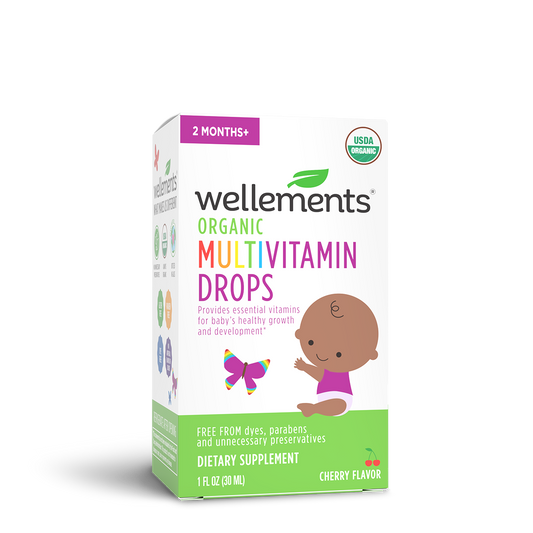The Benefits of Magnesium
| updated:Share

Magnesium is one of the many substances we need to survive and thrive. Review this guide to find out why magnesium is vital and how to determine if your baby is getting enough of this crucial mineral.
What Is Magnesium?
The nutrient magnesium occurs naturally in the body and exists in many of the foods we eat. What does magnesium specifically do? It supports more than 300 different functions of the enzyme system and up to 800 other physical and cognitive processes. This magical mineral works with other bodily vitamins and minerals to help muscles and nerves function properly, keep blood pressure in check, aid in the healthy development of bones, support the immune system, and promote sleep.
Why is Magnesium Important for Infants?
Getting sufficient magnesium during infancy is essential for virtually everything: nutrient absorption, digestion, immunity, DNA formation, regular bowel movements, balanced blood sugar, mood, healthy bones and teeth, muscle and nervous system function. Various studies also indicate a lack of magnesium can interfere with healthy sleep. Because of magnesium’s role in all of these processes, it can heavily impact your baby’s behavior and behavioral regulation.
Signs Your Baby May Need Magnesium Support
According to the National Institutes of Health, the recommended daily magnesium intake for infants up to 6 months is 30mg/day. The daily dosage more than doubles to 75mg/day for babies 7-12 months. When it comes to infants, detecting magnesium deficiency can be challenging because its two main symptoms, sleep issues and constipation, are quite common. Therefore, it is important to consider other signals. Earlier signs of magnesium deficiency may manifest as loss of appetite, fussiness, frequent crying that is not hunger related, fatigue, and weakness. More serious symptoms may include muscle spasms, tremors, or twitches, irregular heartbeat, high blood pressure, and asthma.
Talk to your baby’s health care provider if you think they may not get enough dietary magnesium, especially if you notice any deficiency symptoms. A simple blood test can determine your infant's magnesium levels and whether a supplement may help.

Benefits of Magnesium for Infants
Magnesium is instrumental to your baby’s overall ability to relax because it is the mineral that actually allows muscles to release tension. This is critical for a well-regulated nervous system, promoting overall calm and better sleep.
Similarly, adequate magnesium allows for the muscles in your baby’s intestine to relax as well. This, in addition to magnesium’s role in drawing water to the intestines, can make it incredibly effective at relieving constipation and promoting healthy bowel movements.
Natural Ways to Support Magnesium Intake
Magnesium from breast milk is readily absorbed by infants. Though there can be some deviations in quantity based on a mother’s health, it is consistently available and transferred to your baby through breast milk. Magnesium is also an FDA mandated ingredient, required to be present in sufficient quantities in all baby formula. Once introducing solids to your baby, bananas and avocados offer excellent, easily-digestible magnesium rich options.

When to Consider a Supplement for Your Baby
Unlike in breastmilk or foods, magnesium supplements come in various “forms.” For example, supplementing with magnesium glycinate often improves sleep while magnesium l-threonite may enhance cognition and memory function. General rules of thumb for choosing an infant magnesium supplement: look at the label when shopping for magnesium supplements for your child to find clean, easily absorbable options, and avoid brands that have more calcium than magnesium as too much calcium can worsen deficiency symptoms.
There is such a thing as too much of a good thing… excessive magnesium intake could potentially result in respiratory, cardiovascular, and various other issues, otherwise coined as hypermagnesemia. Though supplements can be beneficial, it is important to check with your baby’s doctor before starting any supplements.
Since the presence of other key vitamins and minerals are critical in aiding magnesium’s ability to do its many jobs, an organic and comprehensive supplement like Wellement’s MultiVitamin Drops can act as a dependable partner to better ensure your baby’s proper development. Free from artificial ingredients, allergens, parabens, and gluten, the easily absorbed MultiVitamin Drops are safe for babies as young as 2 months old. After shaking the bottle, the dispenser can either be given directly by mouth, or mixed with food or drink. Because it is free of preservatives, store the Wellement’s drops in the fridge until the next day for up to 3 months.
Magnesium is essential to your baby’s health in virtually every sense. Being mindful of adequate magnesium intake, as well as the various other vitamins and minerals that allow magnesium to do its part, is fundamental to your baby’s holistic wellness.
3.8 /
5.0
(153)
153
total reviews
Multivitamin Drops
Sale price
$14.99
Sources:
- https://www.rupahealth.com/post/magnesium-for-kids-exploring-its-benefits-in-sleep-and-behavior-regulation
- https://ods.od.nih.gov/factsheets/Magnesium-Consumer/
- https://www.vinmec.com/eng/blog/signs-and-consequences-when-children-lack-magnesium-en
- https://pubmed.ncbi.nlm.nih.gov/7669512/
- https://publications.aap.org/pediatrics/article-abstract/105/2/e18/62564/Fatal-Hypermagnesemia-in-a-Child-Treated-With?redirectedFrom=fulltext



